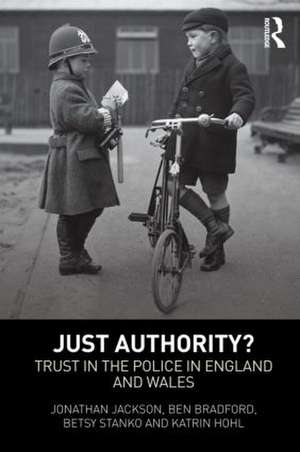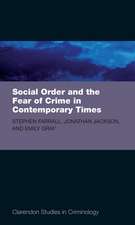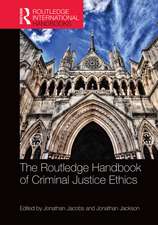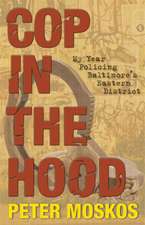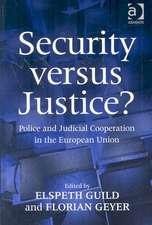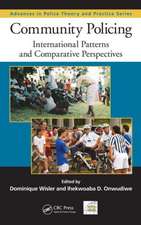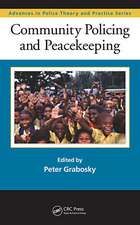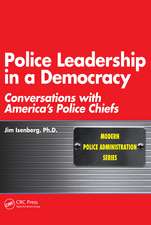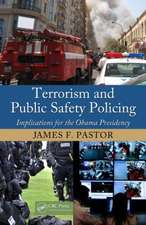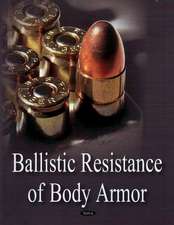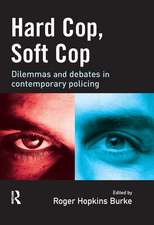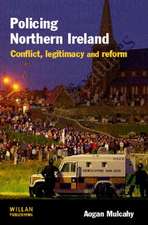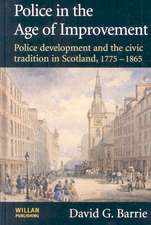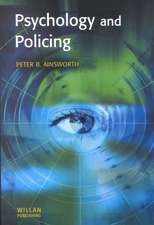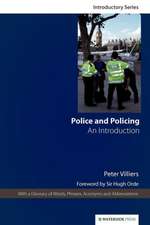Just Authority?: Trust in the Police in England and Wales
Autor Jonathan Jackson, Ben Bradford, Betsy Stanko, Katrin Hohlen Limba Engleză Paperback – 27 ian 2014
Drawing on psychological and sociological explanatory paradigms, Just Authority? presents a cutting-edge empirical study into public trust, police legitimacy, and people’s readiness to cooperate with officers. It represents, first, the most detailed test to date of Tom Tyler’s procedural justice model attempted outside the United States. Second, it uncovers the social ecology of trust and legitimacy and, third, it describes the relationships between trust, legitimacy and cooperation.
This book contains many important lessons for practitioners, policy-makers and academics. As elsewhere the dominant vision of policing in Great Britain continues to stress instrumental effectiveness: the ‘fight against crime’ will be won by pro-active and even aggressive policing. In line with work from the United States and elsewhere, Just Authority? casts significant doubt on such claims. When people find policing to be unfair, disrespectful and careless of human dignity, not only is trust lost, legitimacy is also damaged and cooperation is withdrawn as a result. Absent such public support, the job of the police is made harder and the avowed objectives of less crime and disorder placed ever further from reach.
| Toate formatele și edițiile | Preț | Express |
|---|---|---|
| Paperback (1) | 485.40 lei 6-8 săpt. | |
| Taylor & Francis – 27 ian 2014 | 485.40 lei 6-8 săpt. | |
| Hardback (1) | 1169.78 lei 6-8 săpt. | |
| Taylor & Francis – 30 iul 2012 | 1169.78 lei 6-8 săpt. |
Preț: 485.40 lei
Nou
Puncte Express: 728
Preț estimativ în valută:
92.89€ • 97.67$ • 76.75£
92.89€ • 97.67$ • 76.75£
Carte tipărită la comandă
Livrare economică 17 aprilie-01 mai
Preluare comenzi: 021 569.72.76
Specificații
ISBN-13: 9780415623469
ISBN-10: 0415623464
Pagini: 256
Ilustrații: 32 black & white illustrations, 52 black & white tables, 32 black & white line drawings
Dimensiuni: 156 x 234 x 17 mm
Greutate: 0.36 kg
Ediția:1
Editura: Taylor & Francis
Colecția Willan
Locul publicării:Oxford, United Kingdom
ISBN-10: 0415623464
Pagini: 256
Ilustrații: 32 black & white illustrations, 52 black & white tables, 32 black & white line drawings
Dimensiuni: 156 x 234 x 17 mm
Greutate: 0.36 kg
Ediția:1
Editura: Taylor & Francis
Colecția Willan
Locul publicării:Oxford, United Kingdom
Cuprins
Part 1: Introduction 1. Social and moral connections, 2. Design of the study Part 2: Trends and trajectories 3. Twenty-five years of public confidence in the police, 4. Twenty-five years of public contact with the police Part 3: Why do people trust the police? 5. What is trust in the police? 6. Mass media, 7. The social ecology of trust in the police, 8. One type of contact: being approached by the police, 9. A focus on a special population: young males from Black and Minority Ethnic groups 10. Another type of contact: reporting crime Part 4: Why do people grant the police legitimacy? 11. What is police legitimacy? 12. The social ecology of police legitimacy, 13. Procedural justice and contact with the police Part 5: Why do people cooperate with the police? 14. Cooperation and the probability of procedural justice, 15. Revisiting a special population: a focus on young males from Black and Minority Ethnic groups Part 6: Conclusions.
Notă biografică
Jonathan Jackson is Senior Lecturer in Social Research Methodology, LSE, and member of LSE's Mannheim Centre for Criminology.
Ben Bradford is an Career Development Fellow, Centre for Criminology, University of Oxford.
Betsy Stanko is Emeritus Professor of Criminology, Royal Holloway, University of London and currently works for the Metropolitan Police.
Katrin Hohl is a Research Fellow in the Methodology Institute, LSE.
Ben Bradford is an Career Development Fellow, Centre for Criminology, University of Oxford.
Betsy Stanko is Emeritus Professor of Criminology, Royal Holloway, University of London and currently works for the Metropolitan Police.
Katrin Hohl is a Research Fellow in the Methodology Institute, LSE.
Recenzii
"This book is a landmark in police research. It sets out a well-evidenced and totally persuasive argument for taking issues of police legitimacy and public trust in policing seriously. It should be required reading for anyone with an interest in police reform – but at the same time, it represents a significant advance in criminological theory" – Mike Hough, Professor of Criminal Policy and Co-Director of the Institute for Criminal Policy Research, Birkbeck, University of London, UK.
"The book [...] is a comprehensive and timely exploration of public perceptions of police in London." – Criminal Law and Criminal Justice Books
"This book […] is both relevant to academics for the additions it makes to the theoretical debate around legitimacy and police officers for the inherent policy implications." – Alex Murray, Superintendent, West Midlands Police and chair of the Society of Evidence Based Policing, in Policing: A Journal of Policy and Practice.
"On the basis of this review, I would recommend the text for its engaging content, and relevance within current literature on the subject. It has the potential for a wide readership, drawing as it does upon theory and empirical findings in an accessible way, to discuss a timely and significant topic in the form of public and police relations. That there are important implications to be gained from such discussions, notably in terms of increased challenges for police where public support is lost or damaged, may also highlight the innovative nature of this text." – Emma Smith, University of Stirling, The Howard League for Penal Reform
"The book [...] is a comprehensive and timely exploration of public perceptions of police in London." – Criminal Law and Criminal Justice Books
"This book […] is both relevant to academics for the additions it makes to the theoretical debate around legitimacy and police officers for the inherent policy implications." – Alex Murray, Superintendent, West Midlands Police and chair of the Society of Evidence Based Policing, in Policing: A Journal of Policy and Practice.
"On the basis of this review, I would recommend the text for its engaging content, and relevance within current literature on the subject. It has the potential for a wide readership, drawing as it does upon theory and empirical findings in an accessible way, to discuss a timely and significant topic in the form of public and police relations. That there are important implications to be gained from such discussions, notably in terms of increased challenges for police where public support is lost or damaged, may also highlight the innovative nature of this text." – Emma Smith, University of Stirling, The Howard League for Penal Reform
Descriere
Just Authority? provides the most authoritative and comprehensive analysis thus far of the meaning, distribution and significance of trust in the police and the legitimacy of legal authorities. Drawing on psychological and sociological explanatory paradigms, Just Authority? presents a cutting-edge empirical study into public trust, police legitimacy, and people’s readiness to cooperate with officers.
It represents, first, the most detailed test to date of Tom Tyler’s procedural justice model attempted outside the United States. Second, it uncovers the social ecology of trust and legitimacy and, third, it describes the relationships between trust, legitimacy and cooperation.This book contains many important lessons for practitioners, policy-makers and academics.
It represents, first, the most detailed test to date of Tom Tyler’s procedural justice model attempted outside the United States. Second, it uncovers the social ecology of trust and legitimacy and, third, it describes the relationships between trust, legitimacy and cooperation.This book contains many important lessons for practitioners, policy-makers and academics.
